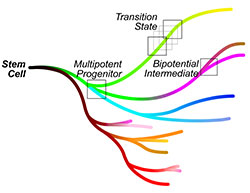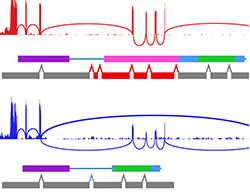Salomonis Lab Projects
Research in the Salomonis Lab focuses on the following areas of interest.
Defining Immune Cell-States Using Single-Cell Genomics
Single-cell genomics provides limitless opportunities to explore tissue cellular variation, but presents numerous challenges to infer genomic impacts that extend down to individual clonal cell populations and heterogenous patient populations. Our current work aims to integrate diverse single-cell modalities (alternative splicing splicing, genetics, cell surface protein, cell states) using holistic new computational frameworks, to resolve clonal impacts in cancer. This work builds on our previously developed approaches to automatically develop cell atlases from multimodal readouts using game theory (scTriangulate), discover novel intermediates (ICGS, DoubletDecon) and identify disease-specific gene regulatory networks (cellHarmony, UDON).

Alternative Splicing in Human Diseases
Alternative splicing is a primary mechanism used to achieve mRNA transcript and proteomic diversity in higher eukaryotes. However, in malignancy, altered mRNA splicing can lead to aberrant protein products that promote oncogenic transformation and confer chemotherapy resistance. Our lab applies cutting-edge genomics technologies and bioinformatics approaches to dissect the role of alternative mRNA gene regulation in diverse malignancies and genetic disorders. These approaches include improved methods to detect alternative mRNA splicing regulation from conventional and long-read mRNA sequencing, predict which splicing events will result in functional protein products, predict clonal splicing impacts, infer immunogenicity of antigens using deep learning approaches and predict splicing factor regulation using prior networks. Our work ultimately aims to define and validate shared targets for new immuno-oncology strategies, setting the stage for precision patient therapies.




